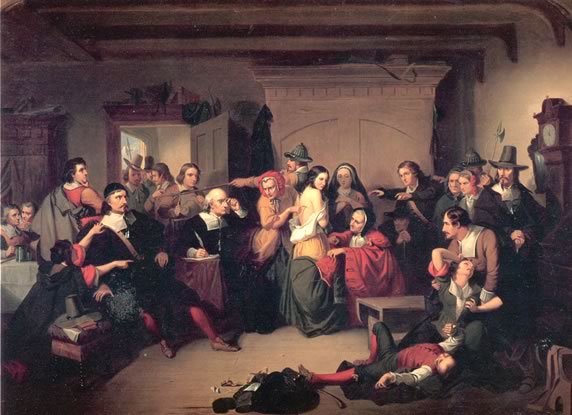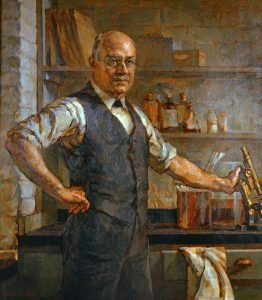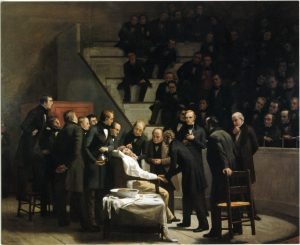Why would adults in Salem, Massachusetts in the 1690s take the accusations of nine year old girls seriously? During the seventeenth century, New England had grown diverse. The people living in the communities were of different backgrounds. But in the 1690’s there was an apparent outbreak of witchcraft. The most famous of these outbreaks was the event in Salem, Massachusetts in 1692 that stirred up the Salem community and soon spread to other communities.
The widespread hysteria over witches was all over the town after an accusation of witchcraft was made in January 1692. A group of young adolescent girls met in the home of Samuel Parris, a Puritan pastor in Salem. The pastor had a nine year old daughter, Betty. Betty and her cousin Abigail were fascinated by the voodoo tales and tricks told to them by the family slave. The family slave, Tituba, was the one whom the little girls had sought after for entertainment.1 It was not long after their time spent with Tituba, when the girls began to behave strangely; seeing visions, babbling at times, and lapsing into trances. The Puritans thought that these behaviors were of witchcraft, as the work of the devil. People in Salem began believing the girls, and charged Tituba and two other village women for practicing witchcraft on them. Two men, John Hathorne and Johnathan Corwin of Massachusetts, were called to do a legal examination of the women. The Puritans followed the Old Testament law. This was how they assessed the examinations. Scripture had a statement that said witches were not able to live. The two men knew exactly what they had to do. The examination was done on these women of Salem by looking for a certain mark on the body: a wart or tit. This specific mark was said to be the place where the devil and his demons would take blood out of the witch.2 Many of the women accused were of lower status in the community.

Research shows most of the accused witches were middle-aged women, widowed, with few or no children. Also, if the woman had been involved with domestic conflicts, they were accused. The women were accused of crimes and appeared to be dangerous by their neighbors. Women in Salem who inherited or possessed land were also accused of witchcraft.3 The accusations towards these women were out of the ordinary and seemingly wrong. One must first think about the view of women during this time. They were undermined and portrayed as having no power or knowledge of such things; they were subservient to the men in the community. Not only were low class women accused of witchcraft, but as time passed, superior women were accused as well.4
On October 29th, the Salem Witch Trials were called to an end. Governor Phips dismissed the Court and that marked the end to the witch hunt craze. Many were disappointed about the ending of the trials, but many were glad to return to work.5 The community in Salem blamed Pastor Parris for letting the innocent die. The people of the Salem church also voted to void his salary. In the following years, those family members of the deceased were restored their good names. The families were awarded a compensation for all the financial loses they went through during such tragic times. Increase Mather, a pastor of the Boston Puritan Church, wanted the people to do away with the court because he believed they put innocent people to death.
The Witch trials took on an important role in American History. The trials became a tragic and memorable moment in history. Generational, racial, and sexual hostility, opposition to law, social stresses, and food poisoning were all causes as to why the people had anxieties that found release in the witch hunt craze. The witch hunts became searches for scapegoats; the community leaders were looking for anyway possible to ease the community’s anxieties.6
- Kenneth P. Minkema, “In the Devil’s Snare: The Salem Witchcraft Crisis of 1692,” The Christian Century, no. 8 (2003): 37. ↵
- Salem Press Encyclopedia, January 2015, s.v. “Salem Witchcraft Trials,” by Warren M. Billings and Kimberly Manning. ↵
- Alan Brinkley, American History, 15th ed., vol. 1: to 1865 (2 Penn Plaza, New York, NY 10121: McGraw Hill Education, 2015), 86-87. ↵
- Salem Press Encyclopedia, January 2015 s.v. “Salem Witchcraft Trials,” by Warren M. Billings, Kimberly Manning. ↵
- Salem Press Encyclopedia, January 2015 s.v. “Salem Witchcraft Trials,” by Warren M. Billings, Kimberly Manning. ↵
- Salem Press Encyclopedia, January 2015 s.v. “Salem Witchcraft Trials,” by Warren M. Billings and Kimberly Manning. ↵



178 comments
Rafael Portillo
Great article, I spent a good chunk of high school reading about the Salem witch trials and the effects it had towards the mass community. However this article was a new outlook for me. I didn’t know how bad and painful the trials was for the women and how Pastor Paris had a huge negative impact
Kimberly Rivera
The Salem witch trials have always been one of my favorite colonial history and I really enjoyed how you made the story interesting and quick to read. The way that the information connected and kept the story in an easy pace even though it was a short article was amazing and made it faster and easier for me to comprehend than when i read a textbook.
Emily Rodriguez
I’ve always enjoyed reading about the Salem witch trials and the different women that were accused and their stories. This article did a great job at briefly explaining the with trails and why people began accusing others of witch practices. I also think the article had a great first line that pulled in the reader’s attention right away so that we would continue reading. Great job! It was very interesting to read and a great perspective on it.
Vanessa Preciado
Hello! Nice article on the Salem witches! It really amazes me that people at that day would harshly accuse 9 year old girls of these very deep accusations. Actually in general I believe they were just very harsh to all women who seemed to be widowed, single or have had little no no children, they just seem so judgmental in my opinion. But then I am little skeptical about the house slave teaching the young girls about these stories and talking to them about witchcraft, and possibly putting a trance/spell on the young girls? This article Is really on point. I am excited to learn more about this topic.
Jackie Velasquez
This article was very interesting to read. I’ve heard of the Salem with trials, however I didn’t know how easy it was to get accused of witchcraft. A silly reason I thought getting accused for, was inheriting land. However, you did help me remember that women were not so dominant at this time and that they had no power to have a say in things. This article definitely makes me want to look more into the Salem witch trials.
David Kamel
I really do like this article, I think the name was the best part. Great writing style as well as format. Well thought out sources as well as detail even with it being a shorter article. You are really able to cram so much information into such a short writing without it being forced, and you are even telling a little story!
Sudura Zakir
Salem witch trial is one of the most famous topic I heard before and the accusations are mostly unknown. Actually no one knows the origin of this witchcraft at Salem. This seems like power of upper class over female group. This topic has most of the controversial opinion and too much arguments about the witches. Killing women, lots of old point of views, it’s like ruling over women but still no one knows the true story of witches. The ruling power also got the chance due to it. Overall, it’s kind of complex to either agree or disagree.
Rosa Deyo
It truly is tragic that so many innocent women were put to death during the Salem witch trials. It really shows how far women’s rights have come since the colonization of North America. As dark as this moment in history is, it serves as a cautionary tale to not be too quick to accuse people of something. Thank you for writing this.
Erica Mata
I found this article very interesting. I think it is interesting the fact that any woman was seen as someone who did witchcraft. At first only women who had none to a couple of children were getting blamed on for witchcraft but later on even women of higher class were blamed as well. This lets us know how poor they would think of women back then. The author did an excellent job at making this article engaging for us to read.
Kristen Leary
The Salem Witch Trials always seems to be one of those topics in history that fascinates so many people. It is so hard to believe that so many were accused and put to death, all beginning from a couple of little girls. I really enjoyed reading your article! There’s a lot that can be covered over this topic, but I think you did a good job of covering the most important aspects in a shorter, easy to read article.